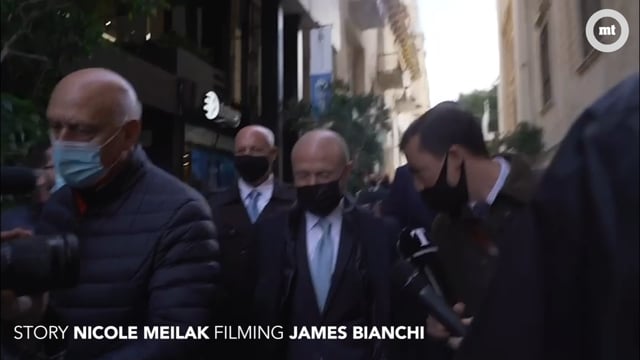[WATCH] Joseph Muscat defends VGH hospitals concession, rejects it was a done deal
Vitals court case | Former prime minister Joseph Muscat says he fully trusts Prime Minister Robert Abela is doing what he thinks is best in renegotiating hospitals concession • Konrad Mizzi in quarantine again


Joseph Muscat has insisted that an agreement penned with a group of investors for the transfer of public hospitals was "different" from the eventual deal that saw three public hospitals being transferred to VGH.
The former prime minister defended his government's decision to rope in VGH to run the Gozo General Hospital, St Luke's and Karin Grech Rehabilitation Centre when he was called in to testify in a court case initiated by former Opposition leader Adrian Delia.
Muscat said a Memorandum of Understanding signed between Malta Enterprise and a group of private investors towards the end of 2014 on a hospitals concession did not fall within the scope of the public health service's needs. The MoU was terminated at the start of 2015 and government issued an international request for proposals. However, the same investors were eventually awarded the tender.
Muscat said in court that the MoU and the RfP were two different things despite the investors being the same.
READ ALSO: [WATCH] Adrian Delia says government should negotiate with Steward from a position of strength
Grilled by lawyer Edward Debono and former PN leader Adrian Delia, the former PM defended the agreement and refused to subscribe to the notion that the investors failed to carry out any work.
The former PM also insisted that then health minister Konrad Mizzi, who was responsible for the deal, did nothing behind Cabinet's back.
Muscat could not recall who had approached Steward Healthcare to take over the concession agreement when VGH faced financial difficulties. He insisted a new clause negotiated with the American company that made government responsible for all the debt if the contract was rescinded by the court was needed as a guarantee to protect a local bank.
Konrad Mizzi, who was also expected to testify, notified the court that he was unavailable. Mizzi is in mandatory quarantine after having returned from abroad. Judge Francesco Depasquale ordered that if in the next sitting, Mizzi is unavailable, his testimony could be heard via videoconferencing.
Delia had initiated court proceedings to have the controversial hospitals concession contract rescinded and have the buildings returned to the public.
On his way out of court, Muscat said he had full trust in Prime Minister Robert Abela when asked about the government's attempts to renegotiate the agreement. "They will do whatever they feel is best in the circumstances," Muscat said.
Background
Vitals Global Health Care, known as VGH, were given a concession by Muscat’s government to run the Gozo General Hospital, St Luke’s and Karin Grech Rehabilitation Hospital. As health minister, Mizzi was responsible for the multi-million-euro deal.
However, VGH failed to honour its commitments and eventually pulled out of the agreement just 21 months into the deal after it sustained mounting debt. The concession was transferred to Steward Healthcare but VGH CEO Ram Tumuluri reportedly still received a €5 million bonus.
A damning National Audit Office report found that the government had signed a Memorandum of Understanding with several investors who eventually formed VGH, months before an international request for proposals was even issued.
Government was paying VGH around €70 million per year to provide hospital beds to the State.
MaltaToday had reported last year that Mizzi entered into an agreement with Steward in August 2019 that should the hospitals concession be terminated by a court of law, irrespective if Steward is in breach of contract, this would be considered a government default and the State would be liable to pay €100 million to buy out Steward.
The agreement also meant that all debts incurred by Steward would be passed on to the government.
Since January last year, government has been renegotiating the hospitals concession with Steward. On Sunday, MaltaToday revealed that a new deal is likely to see the government ‘take back’ the three hospitals but retain Steward as facility managers.


.png)



.jpg)










.png)




